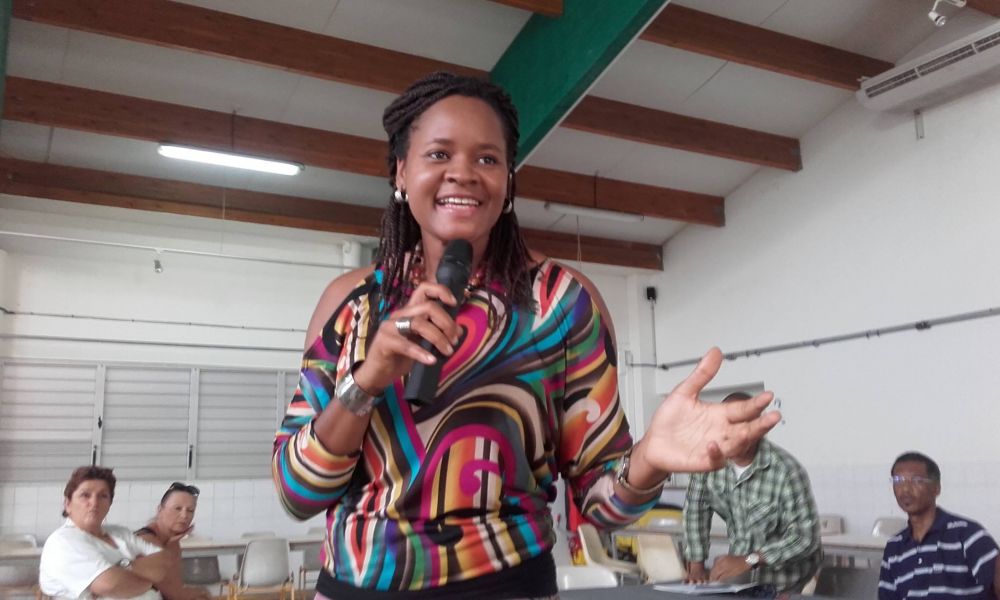A Caribbean youth summit in Saint-Martin ?
What inspired you when you decide to write Jeunes d'Outre-mer, le cas de la Guadeloupe (unofficial translation: Young people from overseas, the case of Guadeloupe), published by Editions Nestor in February 2016 ?
I got the idea to write this book four years ago when I was living in Paris in the 19th district. I met a lot of young French people from the overseas territories: People from Reunion and Martinique, Polynesians, Guianese and other young Guadeloupeans. We spoke about ways to act and interact within our territories. We regretted that we had left our respective islands in order to allow others to benefit from our skills and knowledge. It is still true today that going elsewhere broadens the scopes of possibilities: educational, professional, cultural...We are French citizens from "Overseas" as if we didn’t really belong to the nation. Therefore, I felt the need to write about us: the young French citizens from Overseas. And on the cases of Guadeloupe because it’s my native island. I entirely wrote this book in January 2016, after a one-year election campaign full of meetings and policy proposals.
What difficulties do the young people from overseas encounter that those from the Mainland do not encounter for example? What difficulties are specific to Guadeloupe? What are your suggestions for countering this situation ?
The disadvantages are mainly structural. The geographical distance between the policy decisions made in Paris and applied without taking into account the particularities of the overseas territories. The small size of our territories. In mainland France, a young person living in Picardy can go study in Bordeaux by taking the train, go from one place to another and still be in the same territory. This trip is less of a hassle than for those who live Overseas. The case of Guadeloupe made up of 6 islands among La Désirade, Marie-Galante, Les Saintes, Basse-Terre, and Grande-Terre is very demonstrative. We have sea, air and land transportation, which has a lot of room for improvement to reach an optimal level, in order to meet the mobility needs of the populations. There’s still a lot that needs to be done. The unemployment rate in Guadeloupe has peaked: 56% among young people. Acts of violence, settling of scores, drug dealing... are occurring more and more frequently in our society, but we don’t have the means to durably fight against these phenomena. I make twenty recommendations in my book that can be achieved during a mandate, in the areas of insertion, health, etc.
You’re a volunteer activist and politician as well as journalist, why write a book? What does the book as a media allow you to do?
Politicians talk a lot, but very few actions materialize. The book is an indicator, a reference tool, a production which is available to the largest number. It is also a useful tool which allows me to reach out and meet those who are interested in public policies for young people. The book gives me opportunities which I didn’t have before. I’m able to go to places where political speeches are no longer welcome.
You said about your book that: “It’s written in a way which is intended to be original. It’s made of ruptures which are the building blocks of the structure that it wants to be.” Could you tell us more about that?
Jeunes d'Outre-mer, le cas de la Guadeloupe (unofficial translation: Young people from overseas, the case of Guadeloupe), is a book that I wrote like a video or audio report. It’s also the continuation lined up for this book: its translation into images. I meet young people who have succeeded or who are fighting to succeed. I met scholars and young "junkies" as well as several young partners who are close to them so that this production might reflect the reality as accurately as possible. I frame coherent proposals to improve public policies in favor of youth.
You have been in Saint-Martin for a few days to meet the young people of the island. What is your first impression? What did you learn from the debate at the multimedia library (which was held last night)? At first sight, how is their situation similar to the circumstances young Guadeloupians know? How is it different?
I intervened in five public schools (high schools and middle schools), for the campaign against violence in and out of schools. The young people are multi-cultural, multi-ethnic and have multiple strengths. There is also social misery, promiscuity, practices and codes from over 110 nationalities who live together on the island. I have seen and heard during the presentation of my book in the library, and also in the schools in which I had the honor to intervene, parents and professionals who are exhausted from working with young people, but also extremely motivated. The lack of means is real, but they are doing their best to respond to the issues which involve confrontations, as well as situations to be managed. I love the young people in Saint-Martin, open to the world, trilingual, genuinely Caribbean. I am currently working on "The Caribbean Youth Summit". I would really like this event to be held in Saint-Martin because there is already such a palette of Caribbean youth on the island: Haitians, people from both Dominica and the Dominican Republic, Anguillans, people from Martinique, Guadeloupeans etc...it’s the ideal place for welcoming the Caribbean youth for workshops.
You belong to the so-called “Y” generation. What does that mean for you?
A sacrificed generation, which is paying for the mistakes of our elders. Both on a political as well as economic level. We have the dirty job of fixing all the mistakes of those who have governed us for the last 30 or 50 years. A generation which is not heard and yet enjoys means of communication like never before. I belong to a generation which has everything it needs to succeed but is hindered by some who have failed. Some necessary social struggles have been won by our elders. I admit it. But, since they are undoubtedly exhausted, it’s time to accompany a new generation to face the upcoming major challenges. It’s Generation Y and the Digital natives who will step in. Frantz Fanon said, "Each generation must discover its mission, accomplish or betray it, in relative opacity."
What are your projects? A book on Saint-Martin?
The writing of other books to speak and allow the population to speak. Currently, the freedom of expression and freedom of thought seem to be so flouted that speaking freely has become a public service mission. The affairs faced by the journalists and whistleblowers from around the world are proof. A book with the young people from Saint-Martin is an idea that I will realize before "The Caribbean Youth Summit" by the end of the year.
More information and photos of her Saint-Martin meetings on her website and on Facebook.







